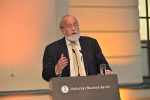Rabbi Joseph Telushkin will be in Vancouver for FEDtalks on Sept. 13. (photo from HarperCollins)
A group of elderly retired men routinely gather in a Tel Aviv coffee shop and talk about current events. Given the world situation, their chats tend to be very downbeat. One day, one of the men in the group declares, “I am an optimist.”
His friends look at him in puzzlement and one of them asks, “You’re an optimist? So why do you look so worried?” And the man replies, “You think it’s easy to be an optimist?”
This is a joke Rabbi Joseph Telushkin tells when he speaks about Jewish humour – a topic on which he literally wrote the book. It also sums up his response to a question posed by the Jewish Independent in a recent telephone interview.
Telushkin is the author of more than a dozen books, including the two-volume A Code of Jewish Ethics, Jewish Literacy: The Most Important Things to Know About the Jewish Religion, Its People and Its History and The Book of Jewish Values: A Day-by-Day Guide to Ethical Living. He is routinely cited as one of North America’s most engaging thinkers and writers on Jewish topics and he has devoted his life to Jewish education.
“I am by nature an optimist,” he said, explaining that his study of Jewish history inspires pessimism, but Judaism’s promise of messianic redemption makes him an optimist. “Hence, I end up as an optimist with a worried look on my face,” he said.
Telushkin is one of five leading thinkers – originally there were four scheduled – who will speak at FEDtalks, the kickoff of the Jewish Federation of Greater Vancouver’s annual campaign next month.
Telushkin’s lifetime devoted to Jewish education was motivated in part by his concern that Jewish religious devotion tended to emphasize ritual observances “as if ethics were necessary, but sort of an extracurricular activity.”
Judaism, he said, has important and uplifting rituals, such as Shabbat and the observance of the holidays. “But there are these incredible insights in Judaism that apply to us in every day of our lives.” That is why he wrote The Book of Jewish Values, which is an exploration of ideas and lessons that can be applied day after day.
Exploring these ideas, he said, can ameliorate some of the challenges facing the Jewish people, such as assimilation and intermarriage.
“If two percent of Jews were intermarrying, you could make a big fight and just do everything in your power to stop intermarriage,” said the rabbi. “Once you’re dealing with intermarriage rates approaching 50%, you can either write off the future of the Jewish people … or you can say, guess what, Judaism has things to teach Jews and non-Jews. If Judaism has something to offer people, it can offer it to non-Jews as well. That’s the role that Jewish education can play. We can model values that people can look at and feel enriched by.”
If Jewishness plays a central role in one’s life, Telushkin said, a person should want to share that with a spouse and model Judaism “in a way that would also make them want to share in Judaism.”
With Dennis Prager, Telushkin wrote the book Why the Jews?: The Reason for Antisemitism. The provocative thesis suggests that something particular about Jews inspires Jew-hatred; that Jews bring it upon themselves.
“Antisemitism, we argue, is ultimately a reaction to Judaism and its values,” Telushkin said, “to the Jewish concept of God, which denied the gods of the others, to the Jewish concept of law.”
The centrality of education in the Jewish tradition has led to personal and collective successes that, in turn, have inspired jealousy, he continued. This jealousy leads to antisemitism and it is indeed, Telushkin said, something inherent in Judaism that provokes this response.
“The reason Jews have succeeded, often much more than their neighbours, is because Judaism entered the world with a demand that no other religion had made: that everyone has to be educated – and you shall teach it to your children – and that focus on education led to greater success.”
Antisemitism, he added, is also inspired by the unique theological relationship between God and the Jewish people.
“There is no other religion that fuses religion and peoplehood the same way,” he said. “When Ruth converts to Judaism in the Bible, she says, amech ami, your people shall be my people, Elohayich Elohai, your God shall be my God.”
This connection between religion and peoplehood also defined antisemitism and the way it morphed during the Age of Nationalism. Until around 1800, when the world in which Jews lived was primarily a religious one, antisemitism focused on the God of the Jews and the rejections of the prophets of Christianity and Islam.
“When nationalism emerged, antisemitism was increasingly focused on the people who were Jews,” Telushkin said. Conversion to another religion would no longer erase Jewish national identity, and membership in a peoplehood, a nation, became the focus of antisemitism. “Hence, the greatest antisemitism in the world today is anti-Zionism.”
The most catastrophic forms of tyranny in recent history, Telushkin added, were direct refutations of Jewish values.
“What was Nazism if not a rejection of all the values that Judaism was trying to bring into the world? What was Soviet communism if not a rejection of all the values the Jews bring into the world?” he said. “Nazism and communism were both radical repudiations of the Jewish notion of God. They held that the state had the highest value. That’s why Soviet dissidents used to chant the song ‘I Fear No One Except God,’ because, in a totalitarian society, people who fear God think that there is something higher than the government, higher than the party. Today, of course, there is the danger of Islamists, people who claim to believe in God but who certainly don’t believe in a God whose primary demand of humans is ethical behaviour.”
At FEDtalks, Telushkin will speak on the topic, Tzedakah is Not Charity. The word charity, he said, suggests something done voluntarily, out of love. “While the word tzedakah derives from the word justice, which suggests that it’s not only a voluntary thing to give tzedakah, it’s an act of justice, which means not doing so becomes an act of injustice,” he explained. “What I want to emphasize is that Judaism is rooted in the notion of not just volunteerism but also obligation.”
By example, he suggested comparing two types of diets. People go on diets, he said, usually for one of two reasons – to be physically more attractive or healthier – but few are able to maintain a strict diet for a month or longer without breaking it.
“Because, in the final analysis, it’s voluntary,” he said. “Everyone knows people who keep kosher, who can go for years without eating foods that are forbidden because they feel commanded … when we do something out of a sense of commandment, we do so with a greater sense of consistency.”
Charities often suffer during tough economic times, he added, because people see charity as voluntary. But, even during tough economic times, people pay their taxes because they are afraid of the consequences of not doing so.
“So the notion of mitzvah in
Judaism is a notion of commandment, something is obligatory,” he said. “I emphasize that point because people consider mitzvah a good deed, but it’s really a commandment.”
FEDtalks takes place at the Chan Centre on Sept. 13. For tickets and more information, visit jewishvancouver.com/fedtalks2017. The Independent has invited all of the speakers to be featured in advance of the event. Last week: Ruth Wasserman Lande. Next week: Rabbi Jay Henry Moses.









